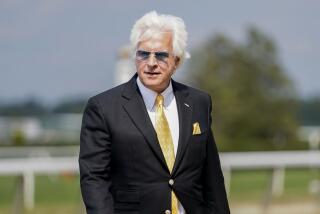U.S. Cyclist Hamilton Is Banned
Olympic gold medal-winning cyclist Tyler Hamilton was banned from competition for two years after an arbitration panel concluded Monday that he had engaged in blood doping in September, the first time a U.S. athlete has been disciplined for such an offense.
By a 2-1 vote, an arbitration panel decided that Hamilton, 34, of Boulder, Colo., who tested positive Sept. 11 at the Tour of Spain, had received a transfusion of someone elseâs blood. The majority said it was âcomfortably satisfiedâ that the Sept. 11 test had a âvery high probabilityâ of having been caused by transfusion.
In a point seized on by the dissenting arbitrator, Hamilton said that the test used to make the case against him had not been properly validated before use to rule out the possibility of false positives. The World Anti-Doping Agency authorized the test for use last summer, only weeks before the Sept. 11 sample was collected.
âWeâre going to appealâ to the Swiss-based Court of Arbitration for Sport, said Hamiltonâs attorney, Howard Jacobs of Los Angeles. âHe didnât do it. What choice is there?â
Hamilton, who finished third in the 2003 Tour de France despite riding virtually the entire three-week event with a broken collarbone, was suspended through April 2007.
Terry Madden, the chief executive of the U.S. Anti-Doping Agency, which prosecuted the case, said in a statement that the ruling shows âno athlete is above the rules.â
The decision came as Lance Armstrong announced his intention to retire after this yearâs Tour de France. Hamilton rode on Armstrongâs team for the first three of Armstrongâs six Tour wins, earning Hamilton a reputation for humility and, particularly after the 2003 Tour crash, for toughness.
âHeâs kind of the all-American cycling hero,â Chris Davenport, one of Hamiltonâs longtime friends, testified at Hamiltonâs hearing six weeks ago in Denver. âPrior to these allegations surfacing, he was the kind of athlete, I think, most people that follow cycling would want their children to be like.
â ... He sort of exemplified all the positive attributes of sport. And while he may not have, at the time, had as big a name like Lance Armstrong, to me, his personality was in many ways far more representative of what a true sport hero should be like. Just super-humble and exemplary.â
Transfusion has long been known in cycling circles as a means of boosting red blood cells, which means more oxygen to the muscles and a bump in endurance.
A series of blood tests Hamilton took in the spring of 2004 at cycling events in Europe showed âstrong signs of possible manipulation,â according to a warning letter issued in June by the International Cycling Union.
Hamilton won the time trial event at the Athens Games. Anti-doping authorities maintain he also tested positive at those Games for blood doping. But the Athens lab froze part of his blood sample, meaning it could not properly conduct the needed analysis, anti-doping authorities have said. Hamilton kept the gold medal.
In the aftermath of the Sept. 11 test, Hamiltonâs racing team, sponsored by the Swiss team Phonak, fired him.
He and his wife, Haven, estimate they are out more than $700,000 in lost wages and legal fees.
More to Read
Go beyond the scoreboard
Get the latest on L.A.'s teams in the daily Sports Report newsletter.
You may occasionally receive promotional content from the Los Angeles Times.







